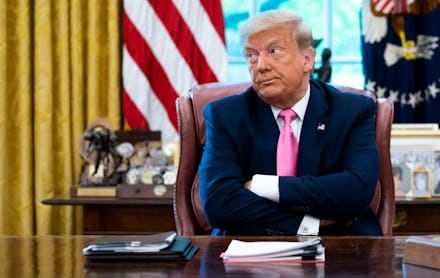Trump suggests delaying the election, which he doesn't have the power to do

President Trump moved one step further along the road to fascism on Thursday morning, musing aloud as to whether he should "delay the election until people can properly, securely, and safely vote???"
According to The New York Times, Thursday's tweet marks the first time Trump has publicly suggested moving the date of the upcoming election, although son-in-law and senior adviser Jared Kushner obliquely suggested it was a possibility during the early stages of the coronavirus pandemic — before quickly backing away from the idea.
The president's tweet came as part of his ongoing effort to transparently delegitimize the perfectly safe practice of mail-in voting— already widely used in a number of states, including by Trump himself in Florida — seemingly to set the stage for him to contest the results of a close election this fall, should the final tally come down to mail-in ballots. The reasoning also stands in blatant contradiction to Trump's ongoing push to re-open America's schools during the coronavirus pandemic. And don't fall for his attempt to differentiate absentee voting from mail-in voting, because in many states they are the same exact thing.
It's important to note that there is absolutely no legal mechanism for Trump — or any U.S. president — to unilaterally change the date of the presidential election. Doing so would require an act of Congress, which means even if the president could somehow convince every elected Republican senator and congressperson to go along with his ur-fascist suggestion, they'd still have to go through a Democratic majority in the House. Which is to say: It's not going to happen.
What's more, even if by some absolutely cursed confluence of astronomically improbable circumstances Congress did move the election date, if Trump loses the race his term in office would still automatically and unambiguously end at noon on Jan. 20, according to the Constitution itself.
So, practically speaking, if there's no legal way for the president to change the date of the election, then just what is Trump doing? While it's certainly possible — even probable — that the president genuinely doesn't know he can't singlehandedly move the election date (a thoughtful constitutional scholar he has not proven himself to be) it seems exponentially more likely that he is seeding the ground for his supporters to simply reject any election outcome that doesn't have him winning a second term — especially if his loss were to hinge on counting mail-in-ballots past Nov. 3. And even if the president can't legally change the date of the election, if there's one thing Trump has proven good at during his time in office, it's subverting, and even ignoring, the law itself.
The question now becomes: If the president has no legal means to follow through on his thinly-veiled threat, will his supporters and enablers simply ignore the law and march lock-step behind him anyway? Just hours after Trump's tweet, Fox News seemingly gave his anti-Democratic idea a measure of cover, saying that mail-in voting was "confusing" and forecasting that election results could take days to be finalized.
If the president was watching — and, let's be honest, of course he was — he must have felt pretty good about himself.